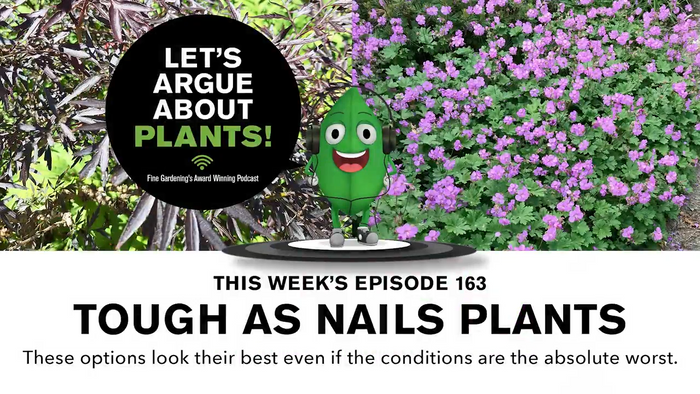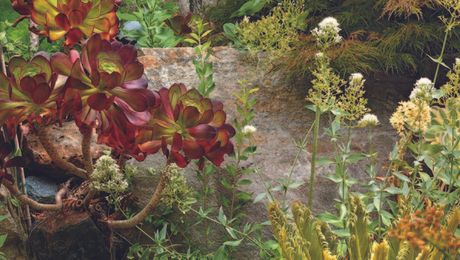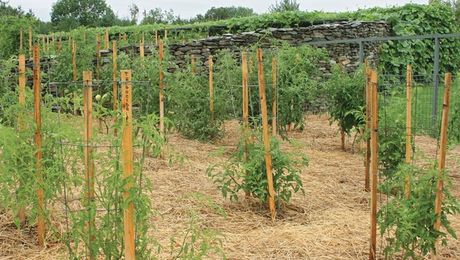
From erosion control to weed suppression, ground covers play an important role in the garden. They benefit neighboring plants by shading the ground, which helps keep soil cool and reduces moisture loss to evaporation. Many ground covers provide nectar to pollinators and shelter ground-dwelling insects and vertebrates. From an aesthetic standpoint, ground covers lend gardens a finished look. They can be used to emphasize focal points or to soften transitions between garden elements. Evergreen ground covers provide these services all year long, while creating a bridge from one season to the next. Here are a few fabulous evergreen ground covers for the Southwest.
Choose from these xeriscape favorites for hot, dry, and sunny locations
Thanks to the benefits they provide, ground covers have become staples of xeric and water-wise gardens. Among the most popular of these is hardy ice plant (Delosperma cooperi and cvs., Zones 6–10), a ground-hugging succulent that grows just 3 to 6 inches tall and spreads up to 2 feet wide. Gardeners and pollinators alike adore the brilliant magenta pink blooms, which cover plants from late spring through summer. Several cultivars and hybrids are available with varying flower colors.
Silver-edged horehound (Marrubium rotundifolium, Zones 4–9) makes a carpet of soft, wooly foliage that gently mounds up to 10 inches tall and spreads 1 to 2 feet wide. The foliage is white on the underside, and the leaf edges curl up to give the light green topsides a silver lining. Most gardeners choose to shear off the flowers, which are insignificant.

Pair silver-edged horehound with the germander sage (Salvia chamaedryoides and cvs., Zones 7–10), a more upright ground cover with fine silver-green foliage and vibrant blue blooms that attract butterflies and hummingbirds. Plants bloom over a long period, from late spring through fall. This semi-woody perennial is great for covering ground; it spreads 3 to 4 feet wide while maintaining a height of 1 to 2 feet.
All three of these ground covers thrive in hot, dry sites in full sun. They are adapted to sandy or rocky soils and require excellent drainage. Once established, these are hardy, drought-tolerant selections.
Consider these native ground covers for challenging sites
Native plants often provide the best solution for challenging areas. A variety of species make excellent evergreen ground covers. Damianita (Chrysactinia mexicana, Zones 7–11) has been gaining popularity throughout the Southwest thanks to its impressive floral displays. Blooming profusely in spring and fall, with sporadic blooms during the heat of summer, damianita creates a golden carpet when planted in mass. Plants grow up to 2 feet tall and wide and are extremely drought tolerant. For the best performance, place damianita in full sun and well-drained soil.
Orange Carpet® creeping hummingbird trumpet (Zauschneria garrettii ‘PWWG01S’, Zones 5–9) is a native cultivar with a low-growing, trailing habit. Also commonly called California fuchsia, this subshrub species spreads like a ground cover, forming a loose mat of gently arching foliage. Orange Carpet® features brilliant red-orange blooms that open mid to late summer and attract hummingbirds to the garden. Water during flowering encourages additional blooms. Give this plant full sun to partial shade and good drainage, and you will be handsomely rewarded.

Not all ground covers are petite. Creeping juniper (Juniperus horizontalis and cvs., Zones 3–9) is widely planted as a ground cover, and for good reason: It covers a lot of space. Spreading 5 to 8 feet wide yet reaching only 12 to 18 inches tall, creeping juniper excels at stabilizing slopes and tackling erosion. Though native to Canada and the northern United States, this needled evergreen is heat and drought tolerant once established. It grows naturally in sandy or rocky soils and requires full sun and good drainage.
Another native shrub, creeping mahonia (Berberis repens and cvs., syn. Mahonia repens and cvs., Zones 5–9) provides excellent erosion control on slopes and banks. It is found primarily at higher elevations in coniferous forests. Plants spread by stolons, which help stabilize soil. Creeping mahonia grows 18 inches tall and wide. With yellow blooms from mid through late spring followed by clusters of blue-purple berries, this low-growing shrub attracts birds and other wildlife to the garden. Plant creeping mahonia in rich, well-draining soil in full to partial shade.
Evergreen ground covers integrate well with deciduous varieties as well as spring bulbs. Use them to line walkways, or plant them under shrubs and tall perennials. In areas with heavier soil, these selections work well in rock gardens and raised planters.
—Kim Toscano is a horticulturist based in Stillwater, Oklahoma. She previously hosted Oklahoma Gardening, a weekly PBS television program produced by the Oklahoma Cooperative Extension Service.


















Comments
Log in or create an account to post a comment.
Sign up Log in